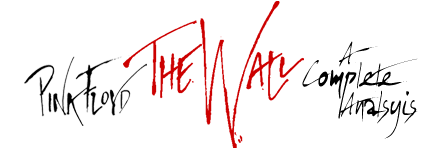Run Like Hell
[Chrous]Run. Run. Run. Run.
[Album - Roger Waters; Waters & Gilmour alternated lines in concert]
You better make your face up in
Your favorite disguise.
With your button down lips and your
Roller blind eyes.
With your empty smile and your hungry heart.
Feel the bile rising from your guilty past.
With your nerves in tatters
As the cockle shell shatters
And the hammers batter down the door.
You better run.
You better run all day and run all night.
And keep your dirty feelings deep inside.
And if you're taking your girlfriend out tonight
You better park the car well out of sight.
Cause if they catch you in the back seat
Trying to pick her locks,
They're gonna send you back to mother
In a cardboard box.
You better run.
Song In A Sentence:
Pink threatens physical violence to anyone who steps out of his authoritarian line as he continues his concert (or at least imagined concert) in his dictator persona.

W ith “In the Flesh” serving as a musical metaphor for the rebirth of Pink into his current fascist persona by taking the song that began the whole album and turning it on its head, “Run Like Hell” revisits the bricks that formed Pink into the person he was. As the audience chants “Pink Floyd” in the background, a familiar staccato rhythm slowly builds, immediately conjuring up the “Another Brick in the Wall” triptych that largely served as the structure around which the album’s first half was created. And yet as soon as the musical connection is laid, the song diverges with a bright, almost cuttingly focused main guitar riff that suggests a new beast altogether. Sure enough, while the “Brick in the Wall” songs were largely centered around the first person personal pronouns me, we, and I, “Run Like Hells” shifts the lyrical focus to a more threatening you, both implied in the repeated “Run!” of the chorus, as well as direct in the verses themselves. Before, Pink was the one being passively acted upon – abandoned by his father, oppressed by his teachers, generally burdened by life itself; now, he’s the one threatening action.
Roger Waters oversimplified “Run Like Hell” by stating that it’s Pink “doing another tune in the show…in his drug crazed state.” (Again, it’s arguable whether Pink is, in reality, performing on stage, or whether these songs are all part of his delusion.) At first glance, it would appear that Pink is threatening to “batter down the doors” of the social pariahs (at least in his delusional opinion) he isolated in the previous song, invoking the destructive power of the dichotomous hammer in a vicious cycle of oppression and abuse much akin to that first addressed in “The Happiest Days of Our Lives” / “Another Brick in the Wall, Part 2.” Like the schoolteacher who punished his pupils as a result of being punished by his wife in “Happiest Days / Brick Part 2,” Pink returns to the world the injustices that he feels the world unfairly placed upon him. His newfound persona not only blames the world for making his former self so weak and passive, but proceeds to turn the self-righteous egotism up a few notches by actively forcing everyone to either become just like him or suffer the consequences. No longer passive, his new self brazenly threatens a generalized “you,” a pronoun that could just as readily apply to the “riff-raff” of the former song as well as us, the audience, suddenly thrown into the role of possible Other / Outsider.
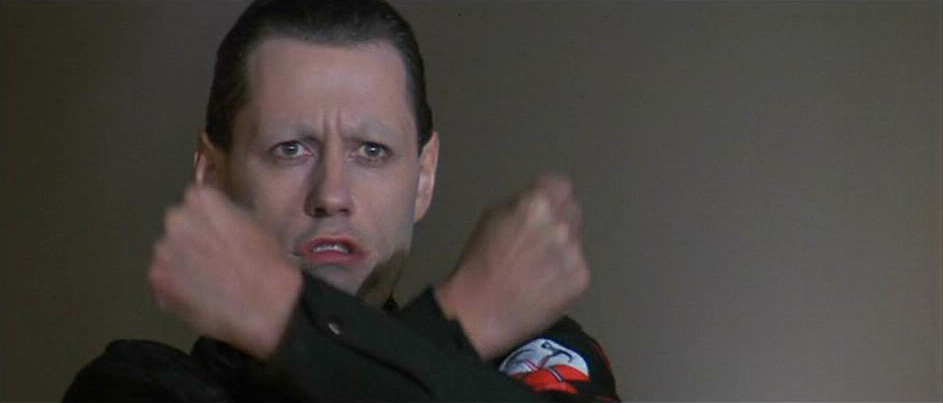
And yet like the guitar rhythm that serves as a musical cue for the creation of bricks both here and in the previous “Bricks” trilogy, there’s something more familiar in Pink’s wording than generalized threats against an unspecified “you.” Here, Fascist Pink accuses “you” of wearing a “disguise” with “roller blind eyes,” a visual that bears some similarity to Pink’s description of himself in the first “In the Flesh?” in which he invites his audience to claw through his own “disguise” and “cold eyes.” “Your empty smile and your hungry heart” might also be said to allude to the hollow individuality and lust for fame and all its trappings as detailed in songs like “What Shall We Do Now?” and “Young Lust.” Similarly, the “dirty feelings” for which the Dictator threatens to “send you back to mother in a cardboard box” bring to mind Pink’s own sexual exploration in the album’s first half, prompting mother to warn that she wouldn’t “let anyone dirty get through.” Put simply, all of Dictator Pink’s threats could easily pertain to himself – a warning, so to speak, to any part of his weaker self that might still be clinging to some small scrap of sanity. There’s no more apt description of Pink’s current state than that “feel[ing of] the bile rising from your guilty past,” what with the bitter sting of a lifetime of repressed emotions erupting to the surface in the guise of his new Fascist persona. Possibly borrowing a symbol from William Golding’s novel Lord of the Flies in which the pivotal destruction of a conch shell symbolizes the overthrow of order by chaos, Fascist Pink defiantly declares his former self’s “nerves in tatters / as the cockle shell shatters” (sounding very much like “conch shell shatters” when sung), essentially issuing in the reign of active chaos in place of the old order (if “order” it could be called) of passive aggression.
In much the same vein as “In the Flesh” paralleled Pink’s personal decline with that of the social decline of Nazi-era Germany, “Run Like Hell” continues to conflate the ideas of individual and social decay as a result of self-imposed isolation. The crowd chant of “Pink Floyd” at the beginning of the song – while fairly innocuous in any other circumstance – takes on a more ominous tone in its placement, blurring the fine line between rowdy audience and mob rule. Rather than shun him for his racist rants, the crowd (in Pink’s mind, at least) goads him on, chanting his stage name as if begging for more. The blurring of that line is made all the more apparent in the song’s movie sequence, in which the audience chants “hammer” and raises their crossed arms in unison, saluting their rock-star god in an image that calls to mind masses of raised-hand-salutes of “Heil Hitler” during Nazi rallies. The black-clad audience ceases to exist as a collection of individuals and becomes a singular mass saluting in unison, dancing in unison, and wearing the same faceless masks. Through the sheer power of his personality, Fascist Pink manages to mold his (imagined) audience into the very faceless automatons that he once, if only inwardly, rebelled against.
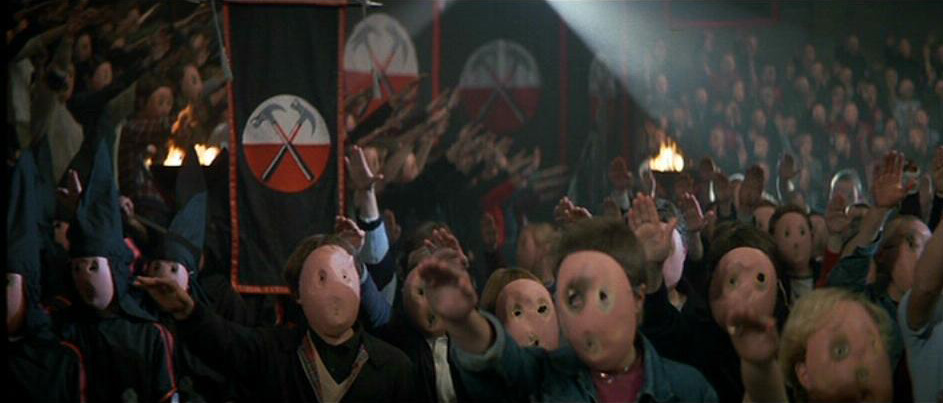
An attack dog is set loose on an outsider; a group of skinheads rush into minority restaurants and houses, tearing the people from their peaceful surroundings and destroying everything in their path. The maggots of decay seethe as an interracial couple are attacked in the back seat of their car, the black man beaten while the white woman is raped by the skinhead mob. And interspersed within these scenes, a shot of three dead men hanging from a scaffold on a hill. The image is overtly powerful, recalling everything from the crucifixion of Jesus and the two thieves on Golgotha to the more contemporary lynching of African-Americans throughout America’s history, especially during the Jim Crow days of the late 19th and early-to-mid 20th century. The implications are all too clear: mob rule is as much a part of the dark side of humanity as the dictators that lead the horde. Just as his fascist persona is Pink’s darkest side, mob mentality is humanity’s…with only the most tenuous of lines separating the two.
That Pink has ironically become the same sort of monstrous zeitgeist that took his father’s life – an event that virtually laid his wall’s first brick – is made all the more apparent in the imagery of Pink’s followers laying waste to the neighborhoods, scenes eerily reminiscent of Kristallnacht (also known as Crystal Night, or the Night of Broken Glass). During the night of November 9-10, 1938, Nazi youth ransacked Jewish neighborhoods throughout Germany and parts of Austria, breaking the windows of Jewish homes and businesses (littering the streets with glass, thus the “Crystal” of Crystal Night) and burning synagogues. 91 Jews died that night, with many more beaten severely. Between 26,000 – 30,000 Jews were arrested and sent to concentration camps in the immediate wake of Kristallnacht, a pogrom that, though clearly orchestrated by Propaganda Minster Joseph Goebbels, was “officially” attributed to spontaneous outbursts in reaction to the assassination of Third Secretary Ernst vom Rath. The pogrom’s recreation-in-miniature within the context of the Wall underscores the viral spread of social decay via the delusions of a single source. Though seemingly inconsequential, the deleterious effects of one man’s wall can be profoundly far-reaching.
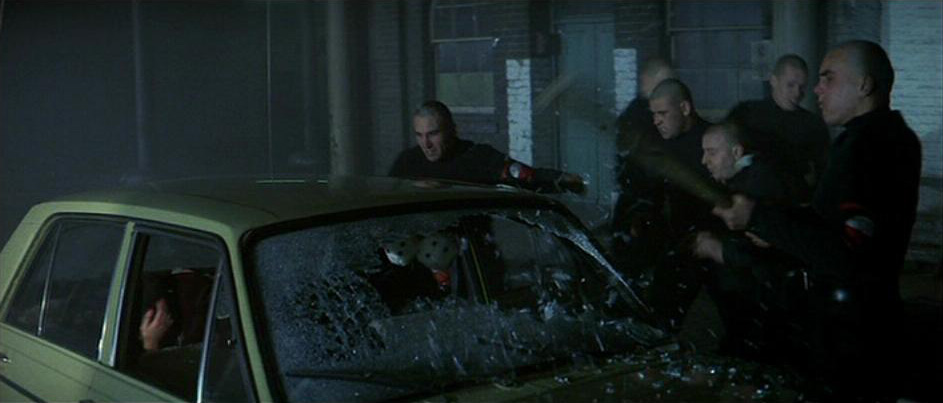
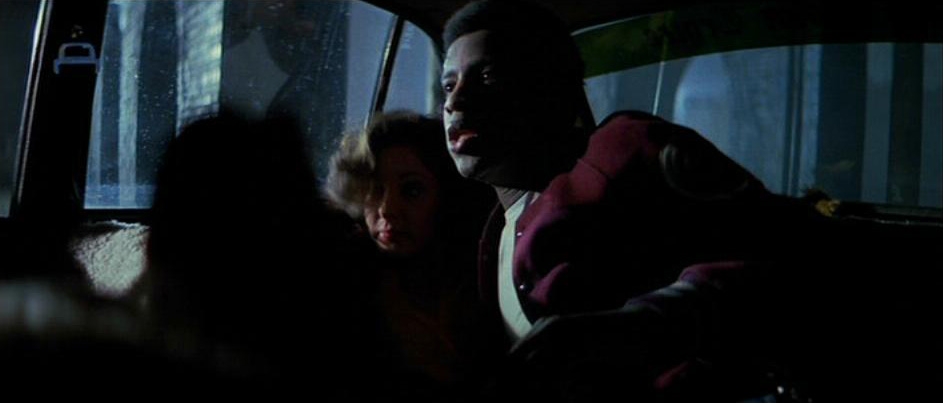
Yet arguably there is a subtle hint of hope amidst the unsettling images of rape and violence. Just as the disturbing image of the three hanged men illustrates mankind’s darker history, it also alludes to the personality shift that has taken place within Pink. Whereas Pink has set himself up as a Christ figure in sequences like “the Thin Ice,” the Christological implications of the hanged men in “Run Like Hell” completely reverse this Christ-like view of himself. Thanks to the emergence of his Dictator persona, Pink now identifies himself as the persecutor rather than the persecuted, joyously demanding the destruction of innocence rather than deludedly casting himself in the role of innocent martyr. Even though this latest character represents the darkest aspects of his soul, that he’s finally beginning to realize that he is, in reality, quite antithetical to any traditional notion of a Christ figure passively afflicted by life’s injustices inadvertently catalyzes his progression towards the redemption he will find in his fast-approaching Trial.
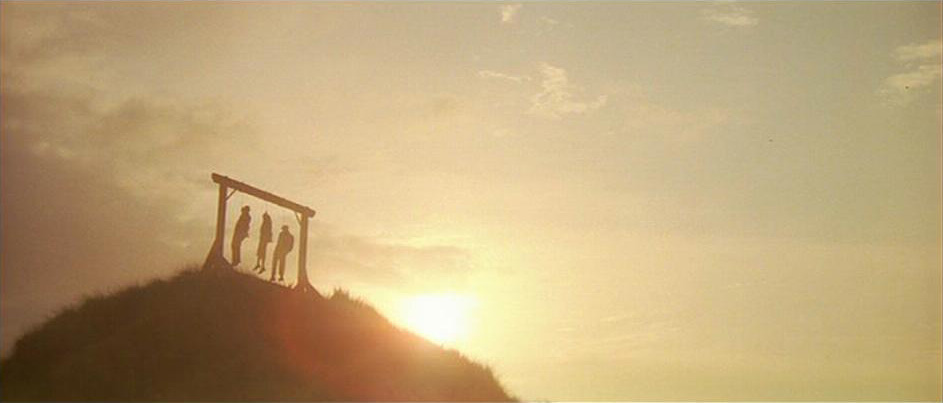
What Other Floydians Have Said
"At the beginning of 'Run Like Hell' the crowd is chanting 'Pink Floyd' from the LEFT audio channel only. A clear representation of Roger's left leaning political beliefs, as well as his opinion that he was Pink Floyd (at least the voice of Pink Floyd). By the end of 'Run Like Hell,' and bridging into 'Waiting For The Worms' the crowd chanting 'Pink Floyd' from the left is now being challenged by the others in the crowd chanting 'Hammer' from the RIGHT channel only. I read an interview with Roger Waters once where he commented on the fascist chant of 'Hammer' being intentionally in the right channel because of their extreme right wing politics. It's almost as if some are following the new fascist Pink by chanting 'hammer,' while others are longing for the old Pink by chanting 'Pink Floyd' (As some people preferred the Syd Era Floyd, some the Pre-Dark Side Floyd, some the Post-Dark Side Floyd, and later on those who preferred the Water's Era Floyd) . By the end of 'Waiting For The Worms,' the chants of 'Hammer' completely, and quite forcibly, replace the chants of 'Pink Floyd' as if Pink is saying, 'The old Pink is no more,' and is actually sucked in by those who he created. - Jason

